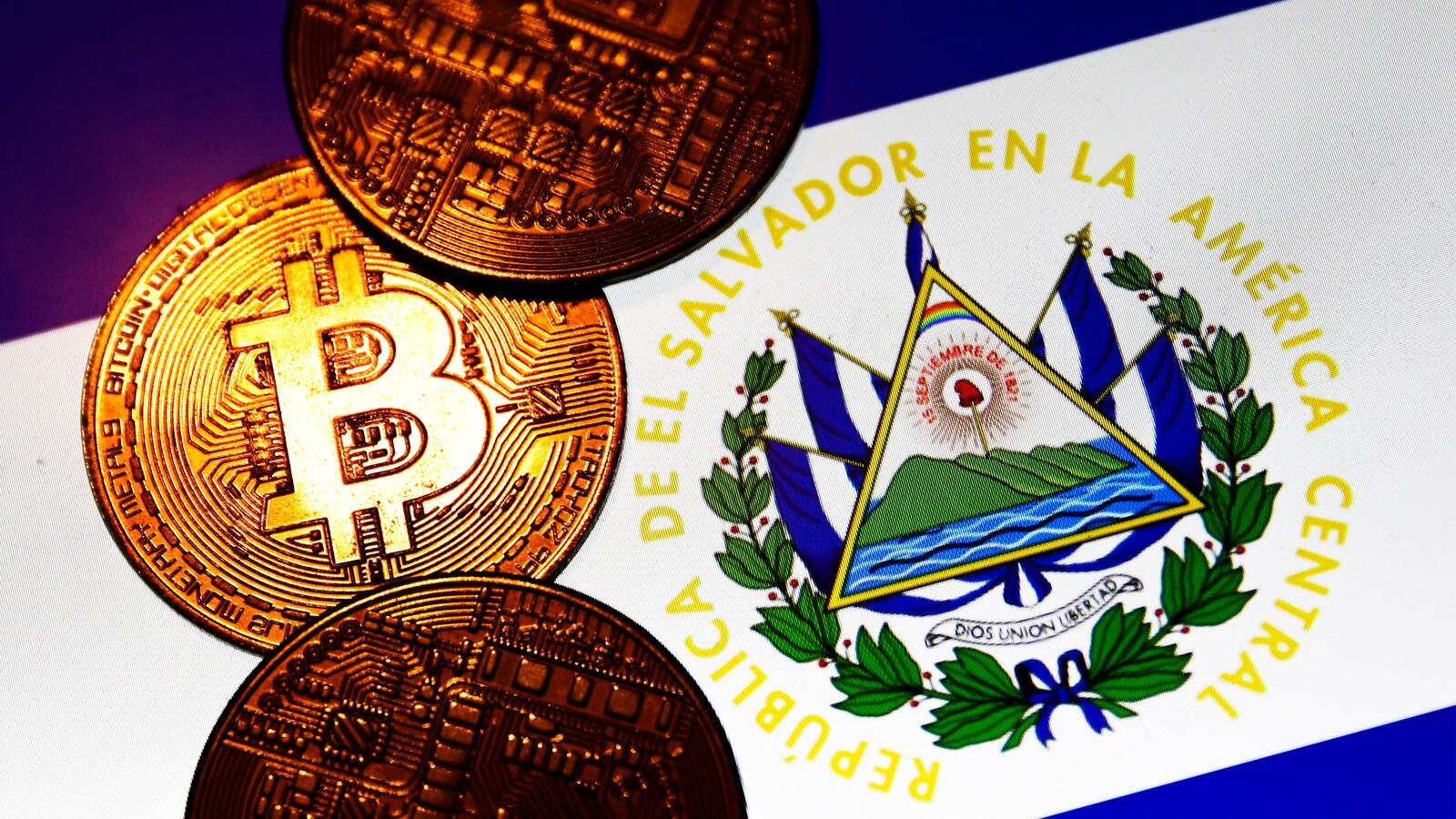El Salvador executed a brave new plan to make bitcoin an official currency of the country last week. The rollout was predictably met with systemic glitches as well as masses of protesters, who took to the streets to express their rage at the “Bitcoinization” of the national economy.
El Salvador’s populist, right-wing president, Nayib Bukele, has trumpeted the cryptocurrency as a way to end the country’s dependence on the U.S. dollar, as well as a breakthrough technology that will aid with remittances sent to El Salvador from abroad.
Bukele is in many ways an acolyte of Donald Trump, who had constantly stoked his base with musings on Twitter and seems to disdain democracy in favor of his own autocratic rule. Like Trump, he also enjoys soaring popularity among a large swath of the Salvadoran populace. His push toward Bitcoin, however, has been a major stumbling block.
Some 68 percent of the population opposes it outright. About 83 percent say they have no interest in using it to receive remittances. And a whopping 92 percent say they don’t want to be paid salaries via bitcoin. Though U.S. dollars remain legal tender for now, the protesters who lit tire fires in the capital were apparently concerned the government would in time mandate citizens’ use of the volatile and unstable cryptocurrency. Bukele’s regime has already mandated that “all economic actors” in the country accept Bitcoin transactions.
“This is a currency that’s not going to work for [street] vendors, bus drivers or shopkeepers,” one of the protesters told Al Jazeera. “This is a currency that’s ideal for big investors who want to speculate with their economic resources.”
And yet there has been tremendous buzz in international media about the new technology, and what it could mean for other state actors going forward. Countries like Venezuela and the Bahamas have already adopted cryptocurrencies, but in those cases they were tied to central banks. El Salvador, on the other hand, is the first country in the world to adopt an independent cryptocurrency.
“This is the farthest any government has gone yet, but Bukele isn’t the only right-wing populist using bitcoin as a way to attract foreign investors,” Brett Heinz, a researcher at the Center for Economic and Policy Research in Washington, D.C., told The Daily Beast.
“Several months before Bukele announced his plans, Viktor Orban also announced plans to use bitcoin tax cuts as part of an attempt at revitalizing the Hungarian economy,” Heinz said. “The final passage of the Hungarian tax cuts came just days after Bukele's announcement.”
A bit closer to home, said Heinz, we have our very own far-right bitcoin enthusiasts in the Republican Party.
Miami's Republican Mayor Francis Suarez is interested in paying city employees with bitcoin, along with investing public funds in the cybercurrency (which Bukele just did, so far at a loss). Florida’s Republican Governor Ron DeSantis is at least curious about cryptocurrency, signing a blockchain bill and appointing a blockchain task force in 2019.
“If DeSantis’ presidential aspirations are real, bitcoin is sitting there waiting as another potential way to make a name for himself,” Heinz said.
“We know bitcoin has fans in Congress from Ohio to Wyoming, so bitcoinization laws could ultimately pop up anywhere. People shouldn’t underestimate how much support this idea has, even if the idea is obviously bad. I can see Silicon Valley types making a major push in this direction even in Democratic states,” he said.
In fact, bitcoin has already been used to further the right-wing agenda in the U.S. According to a report by the Southern Poverty Law Center (SPLC), white supremacists openly call bitcoin “the currency of the alt-right.”
That’s because “[t]he decentralized, peer-to-peer, crypto-currency has obvious appeal to hate group leaders and other influential extremists: No company and no government can intervene to stop the donations from flowing,” the SPLC stated.
Reuters has also shown that hundreds of thousands of dollars were paid to “virtual wallets” held by far-right activists in the run-up to the January 6th attack on Capitol Hill in Washington.
Experts say authoritarian leaders in Latin America are waiting on the results of El Salvador’s experiment before deciding on their own crypto futures.
“Unfortunately, corrupt officials also learn from one another, and will be watching to see how El Salvador’s model unfolds,” said Austin Robles, a Central America expert with the Washington Office on Latin America, in an interview with The Daily Beast. Robles in particular singles out Honduras and Guatemala as likely to be tempted to follow El Salvador down the bitcoin path.
“The presidents in all three of these countries have taken steps to dismantle checks and balances, and have sufficient power to pass unpopular reforms, just as El Salvador did with the bitcoin law,” Robles said.
An authoritarian government willing to act without transparency could use bitcoin to “create a private blockchain or database that would give huge government control over the economy,” said Terry Karl, a professor of political science at Stanford.
“This would permit the government to “print” money, and this in turn could produce all kinds of problems: runaway inflation, the ability to hide money transfers in a country already characterized by money laundering, or even using a form of financial censorship against potential enemies,” Karl said.
While a switch to bitcoin could benefit economic elites, the fallout for economically vulnerable citizens might be disastrous.
“Poverty rates for families in these three countries range from 22 percent to 60 percent, and one negative fluctuation in bitcoin’s value could ruin these households,” Robles said.
“The instability of bitcoin means that anything can happen to those who invest in it. But for the people living in countries where bitcoin becomes legal tender, it affects them whether they invest or not,” added Heinz.
The anonymous nature of bitcoin exchanges would also provide a windfall for money laundering in countries that are widely recognized as narco-states dominated by drug trafficking groups with political clout.
“Because cybercurrencies cannot be regulated and monitored in the way that dollars can, they are made for trafficking and other forms of illegality,” said Karl. “Bitcoin is difficult to regulate and control, which means that even if this is not the original intention, it has incentives built into the system to encourage illegality. This is especially true where there is little or no rule of law.”
According to Robles, “Bitcoinization could provide another economic avenue for organized crime and corrupt officials. It would also deal a severe blow to government watchdogs and oversight groups given the anonymity of bitcoin transactions.”
Ultimately, the hamstringing of watchdogs and oversight groups might be part of the appeal for bitcoin’s biggest advocates.
“Bitcoin is aimed directly at weakening public control over the economy,” Heinz said. “Some bitcoin adherents like Bukele hold a radically libertarian view that the state shouldn’t even have a monopoly over its own money.”








